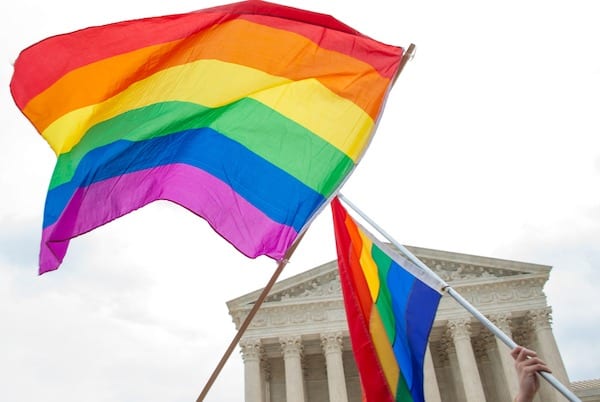LGBTQ+ rights and protections are at risk in America, with the Supreme Court debating whether or not Title VII of the 1964 Civil Rights Act, which bars discrimination “on the basis of …. sex,” protects LGBTQ+ people from employment discrimination.
The Court heard cases from two men who were fired from their jobs in Georgia and New York for being gay, and another from a transgender woman who was fired from her job in Michigan after she told her employer she was beginning her transition.
“In many ways, this is more fundamental than what was at stake [in the case of same sex marriage]”, Ria Tabacco Mar of the American Civil Liberties Union (ACLU) told AFP.
Unlike Australia where we have federal protections for gay, lesbian, and bisexual (but notably, not transgender or gender diverse) people in the form of the Sex Discrimination Act, America’s discrimination laws vary by state.
Less than half of the states in the US ban discrimination based on gender identity or sexual orientation, meaning that it’s legal to fire someone for being LGBTQ+ in most of America. However the cases heard today mean the Supreme Court could potentially rule that discrimination based on sexual orientation or gender identity should be illegal federally, and put protections in place for LGBTQ+ people across the country for the first time in American history.
So far, the court appears divided on which way it will rule, with a decision from the nine justices not expected until June.
Those in favour of the federal law argued that discrimination on the basis of sexual orientation and gender identity constitutes discrimination “on the basis of… sex” because it’s impossible to fire someone for being gay, bisexual, or gender diverse without taking their biological sex into consideration. If a woman is fired for dating women, she’s being treated differently than a woman who dates men, which violates the Title VII. However lawyers for the Trump administration argued that Congress did not specifically outlaw discrimination against queer or transgender people when they passed the Civil Rights Act in 1964, and have repeatedly quoted the dictionary definition of “sex” at the time, which, of course, doesn’t mention sexual orientation or gender identity.
WATCH: Protesters chant and sing outside of the Supreme Court Tuesday, as the nation’s highest court begins to hear arguments in two landmark cases on LGBTQ rights https://t.co/rgw1leY1z3 pic.twitter.com/kHpzWrCF91
— CBS Evening News (@CBSEveningNews) October 8, 2019
With the long wait for a ruling ahead, queer people are concerned. The Court is now majority conservative, and their questions and comments have led some commentators to predict that the Court will rule against queer people. So what will happen if they do?
Around 8 million LGBTQ+ Americans will lose their chance for federal employment protections, and queer people will continue to be legally fired, denied promotions, and lose out on employment opportunities. GLAAD warns that anti-LGBTQ+ opponents could also use the ruling to overturn critical federal protections in housing, healthcare, credit, education, and more.
Non-discrimination protections for cisgender and heterosexual people, notably women, could be at stake too. Sexual harassment wasn’t included in Title VII when it was originally written because it wasn’t being discussed at the time. It wasn’t until the Supreme Court ruled it as a form of discrimination until 1986 that it was included in the act. If conservatives are arguing about the semantics of what Congress may have intended when they passed the Civil Rights Act over 50 years ago developments on protections like this could be at risk. There are also implications about whether or not employers can engage in sex-stereotyping. If an employer can tell a transgender man how to present at work, other employers could easily use the same reasons to tell women what to wear and how to act, undoing decades of work and giving legal protections to companies that sex stereotype.
Protests from both sides were held outside the Supreme Court, with over 500 people taking part in a planned demonstration in support of the LGBTQ+ community. 133 were arrested while sitting in the street outside of the Supreme Court for “crowding, obstructing, or incommoding.”
This is a stark reminder that same sex marriage was not the end of discrimination against LGBTQ+ people. If anything, queer Americans are facing more legal hurdles than they were before, and the potential of these ideas spreading to Australia remains is a real possibility.


